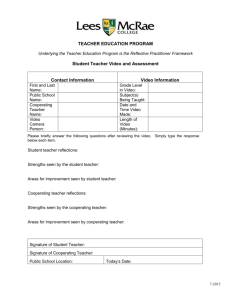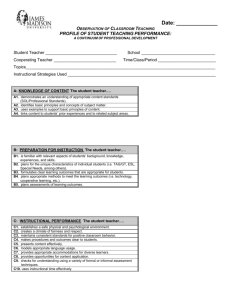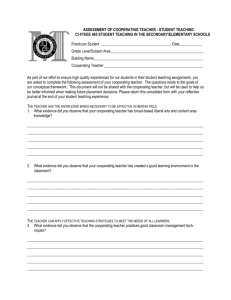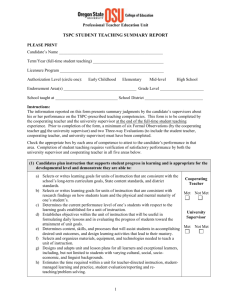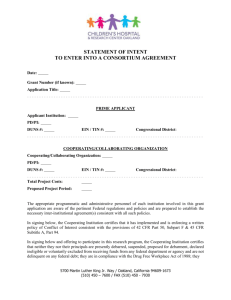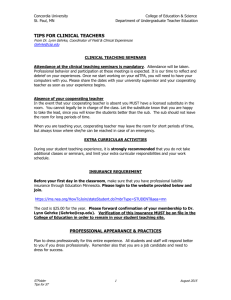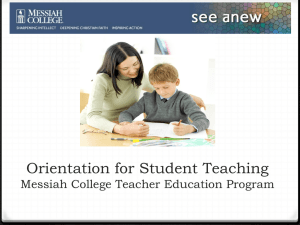New orientation powerpoint - University of the Pacific
advertisement
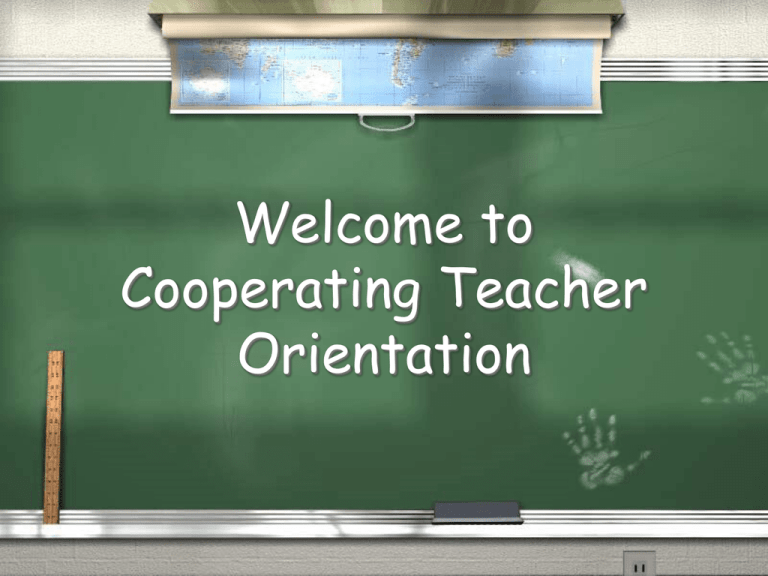
Welcome to Cooperating Teacher Orientation Building a Base Subject Matter knowledge Approach teaching thoughtfully & reflectively Solid pedagogical/theoretical knowledge base Understanding schools in a multicultural, pluralistic democratic society Putting It Into Practice • • • • • Apply and strengthen teaching skills Accept feedback & suggestions Reflect on and adapt own teaching. Observe, discuss & participate. Graded P or NC (equivalent of a “B”) Fulfilling Professional Responsibilities All activities expected of a regular classroom teacher. (yard duty, SSTs, meetings) Maintain confidentiality. Attend all seminars. Dress in a professional and appropriate manner. Time, Attendance, & Schedule Requirements Follow school district schedule and calendar. (not PacificÕ s) Do not take on a major work or social responsibility. Spend, at minimum, the usual number of hours a regular teacher spends in school. Faculty, staff devel., grade level, department meetings; conferences Should expect to spend more time in planning. Seminars: Thursdays, 4:00-6:00 Sp ec. Ed class: Wednesday 4:30 Masters Students • Complete an additional assignment (case study) focusing on their capacity to impact student learning through assessment and reflection. Absences Notify school officials; designated site personnel Contact cooperating teacher Phone university supervisor and leave a message at the Office of Field Experiences. (946-2335) If absent more than 3 days during the semester, may be required to make up the time Absence other than illness will be determined by the Director of Field Experiences after conferring with cooperating teacher, principal, and/or un iversity supervisor. Unexcused absences will be considered unprofessional behavior and may be cause for dismissal. If ill, student teacher should leave the classroom and not return u ntil well. Seminars Listed on calendar Usually (but not always) on Thursdays 4:00-6:00pm. Failure to notify an absence before a seminar will be considered unprofessional behavior and may affect grade. Must prepare lesson plans. Supervision / Assessment Observation by university supervisor Written & oral feedback Cooperative Evaluation Every 4 weeks Student & Cooperating teachers Verification Signature of CT on competencies (TPEs) SEQUENCING Observe Take notes! Routines Assist Individual, small groups short time period Short time periods Teach off teacher’s plans Teach Routines or student teacher’s strength Plan and carry out instruction By time, subject, or period C.T. leaves room for longer periods of time Sequentially take on more responsibilities Solo Responsible for entire classroom program 1-2 weeks/7 week placement shorter if needed for success longer if ready C.T. out of room Plans MUST be approved C.T. may act as aide for program continuity Phase Out Gradually return control to C.T. Observe other teachers/grade levels Continue involvement with students and C.T. COOPERATING TEACHER wModel, support. wObserve wProvide feedback and suggestions. wBe willing to leave the classroom. wProvide access to materials/resources wCover the classroom during seminars. wOrient ST to school/faculty. wProvide a work space. wInfor m of school/classroom procedures. Fire drills, yard duty, copies, materials, parking, grades, record keeping wShare, assist with and review lesson plans. wClassroom management procedures, expectations, a ssistance. wCommunica te with aides, parent volunteers role of S.T. Inform ST of controversial community problems/situations Seating chart/class picture Evaluate ST’s performance Write a letter of recommendation 90% credit for 3 units St. Teachers as Subs • District must agree to conditions • ST must be active district sub • May not sub during first week or “solo” period • Can only sub for Co-op. teacher • Can not be pulled from student teaching to sub
